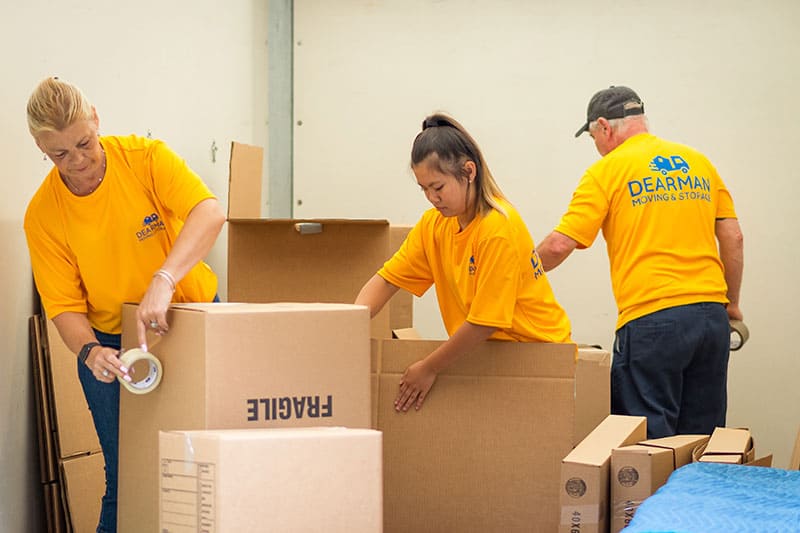How domestic shipping plays a role in global supply chains
Wiki Article
Navigating the Intricacies of moving and Freight Forwarding: Key Insights for Delivery Freight Overseas
Steering via the complexities of moving and Freight forwarding offers various difficulties for businesses participated in worldwide shipping. Comprehending guidelines, crucial documentation, and price aspects is critical for smooth procedures. The selection of a reliable Freight forwarder can greatly affect effectiveness and danger administration. On top of that, correct packaging and effective communication play essential roles in the shipping process. As business face these ins and outs, they have to address vital factors to consider to assure effective overseas shipments.Comprehending International Delivery Regulations
Recognizing international delivery policies is crucial for organizations taken part in global profession, as these policies control the activity of items across boundaries. Each nation enforces specific laws that dictate how items can be imported and exported, including compliance with security tariffs, customs, and criteria procedures. Companies should remain alert about modifications in regulations, as non-compliance can cause considerable delays, penalties, or even the seizure of goods.Moreover, organizations need to navigate various international treaties and agreements that affect delivery methods, such as the World Profession Organization policies. Recognizing these complexities is crucial for reliable logistics administration. Furthermore, identifying the importance of sticking to ecological laws can mitigate dangers connected to delivering hazardous products. Inevitably, an extensive understanding of global shipping policies not just ensures compliance yet likewise boosts a company's credibility and competition in the international industry, allowing smoother purchases and fostering global connections.Essential Paperwork for Overseas Freight
While going across the intricacies of abroad Freight, it is essential for services to ensure they possess the proper documentation. Precise paperwork not only ensures compliance with international regulations yet likewise assists in a smooth shipping process. Secret files consist of the Costs of Lading, which serves as an agreement in between the shipper and provider, and the Commercial Billing, describing the products being shipped and their value. Additionally, a Packing List is critical for customs, providing specifics about the materials of each shipment.Certificates of Beginning might likewise be required to confirm the beginning of the products, while Export Licenses can be required for regulated products. Companies need to be thorough in preparing these papers, as mistakes can cause delays, fines, or also confiscation of goods. For that reason, understanding and organizing essential paperwork is fundamental for successful abroad shipping procedures.Choosing the Right Freight Forwarder
Exactly how can an organization assurance it selects one of the most ideal Freight forwarder for abroad delivery? The very first step entails evaluating the Freight forwarder's experience and online reputation in the market. A well-established forwarder with a solid record is more probable to browse difficulties effectively. Businesses must likewise assess the forwarder's network, confirming they have solid partnerships with providers and representatives in target destinations.Another vital aspect is comprehending the specific solutions supplied, such as custom-mades clearance, cargo insurance coverage, and tracking capabilities. This permits companies to align their requirements with the forwarder's offerings. Furthermore, inspecting recommendations and customer reviews can give understanding into dependability and client service.Finally, participating in straight communication helps make clear warranties and assumptions transparency in operations. By diligently considering these elements, companies can enhance their opportunities of partnering with a products forwarder that satisfies their logistical requirements and contributes to a smoother shipping procedure.Cost Elements in International Delivery

Countless cost factors influence international delivery, significantly impacting a company's overall logistics spending plan. One main factor to consider is Freight prices, which vary based on delivery weight, dimensions, and range. Gas prices likewise play a critical function; variations can significantly boost transport prices. In addition, custom-mades tasks and tax obligations have to be factored in, as these can differ by destination and product kind. Insurance policy is another necessary price, offering insurance coverage against potential losses or damages throughout transit.Other expenditures include port costs, dealing with costs, and storage space costs, which may develop if shipments are delayed. Governing conformity prices, including necessary documents and examinations, also add to the general expenditure. The selection between sea, land, or air transportation can drastically change pricing, with air Freight generally being extra expensive than sea Freight. Recognizing these variables makes it possible for businesses to tactically intend their international delivery budget plan and enhance their logistics operations.
Packing and Classifying Your Goods Properly

Picking Appropriate Packaging Products
When shipping goods overseas, choosing the appropriate packaging materials is vital to ensure things show up securely and intact. The choice of products considerably influences the defense and security of the freight during transit. Durable boxes made from double-walled corrugated cardboard are typically advised for their sturdiness, while bubble wrap, foam peanuts, or air pillows provide supporting to safeguard vulnerable items. In addition, pet crates and pallets may be necessary for larger or larger deliveries to maintain architectural stability - shipping companies. It is additionally important to take into consideration moisture-resistant products, specifically for things at risk to moisture. Eventually, the proper packing products not only safeguard the contents however likewise add to a smoother shipping procedure, lowering the risk of damages and loss throughout transportationEffective Labeling Strategies
Efficient labeling techniques are essential for ensuring that shipped goods are dealt with properly and reach their intended destinations right away. A properly designed tag should include critical details such as the sender's and recipient's addresses, call numbers, and any kind of unique handling directions. Clear and clear text, ideally published in a different color to the history, boosts readability. Additionally, integrating barcodes or QR codes can enhance tracking and inventory management procedures. It is crucial to fasten labels securely to stop them from ending up being separated throughout transit. Using water resistant or weather-resistant materials can additionally protect labels against ecological variables. By employing these reliable labeling techniques, carriers can lessen the threat of misdelivery and ensure an extra reliable shipping experience.Customs Clearance Refine Explained
The customizeds clearance procedure is a critical point in shipping Freight overseas, needing a detailed understanding of required paperwork. It includes maneuvering responsibilities and taxes, which can greatly affect the general price of delivery. lcl shipping. In addition, organizations typically run into typical customizeds challenges that can make complex the procedure, necessitating mindful planning and preparationNeeded Documentation Introduction
An extensive understanding of needed paperwork is essential for successful custom-mades clearance in international delivery. Key papers consist of the commercial invoice, which details the purchase, and the bill of lading, serving as a contract in between shipper and service provider. Furthermore, a packing checklist details the materials find of the delivery, facilitating evaluations. Certificates of beginning may be needed to verify the item's manufacturing area, while import/export permits assurance compliance with guidelines. Various other documentation can consist of insurance policy certificates and particular licenses relying on the products being transferred. Precise and full documentation enhances the customizeds procedure, reduces hold-ups, and minimizes the threat of charges, eventually ensuring that shipments reach their destinations effectively and lawfully.Tax Obligations and duties Discussed
Comprehending responsibilities and tax obligations is crucial for managing the custom-mades clearance process properly. Tasks are tariffs enforced on imported products, computed based upon the item's worth and category. Taxes might consist of value-added tax obligation (BARREL) or sales tax obligation, depending on the location nation's guidelines. Importers have to precisely proclaim the total worth of the delivery, consisting of delivery prices, to determine suitable obligations and taxes. Failure to abide can cause delays, penalties, or confiscation of items. Furthermore, each nation has particular regulations pertaining to exemptions and lowered prices, which can differ greatly. Because of this, comprehensive research study and precise paperwork are critical to guarantee conformity, minimize prices, and help with a smooth custom-mades clearance process.Usual Custom-mades Challenges
Navigating the customizeds clearance process can provide a number of challenges that importers should resolve to guarantee timely shipment of items. One common difficulty involves documentation needs, where insufficient or imprecise paperwork can cause delays. On top of that, toll classification disparities might emerge, causing confusion over obligation prices and potential charges. Importers usually deal with language barriers and differing policies across countries, making complex interaction with customizeds officials. Unanticipated assessments can interrupt timetables and increase prices. Understanding local personalizeds legislations and policies is necessary, as failure to comply can result in fines or confiscation of goods. To minimize these obstacles, importers ought to consider partnering with knowledgeable Freight forwarders that can browse the complexities of custom-mades successfully.Tips for Tracking and Handling Your Shipment
Exactly how can one successfully track and take care of shipments in today's busy shipping environment? To assure seamless logistics, making use of advanced tracking find out this here modern technology is necessary. Lots of Freight forwarders supply real-time radar, allowing carriers to check their deliveries' progress via GPS and RFID technology. Routine communication with the Freight forwarder is likewise vital; they can provide updates on any kind of potential hold-ups or modifications in schedules.Additionally, establishing an in-depth timeline and clear turning points for the shipment can boost monitoring performance. Utilizing shipping management software can consolidate data, making it much easier to track multiple deliveries all at once. It is additionally suggested to maintain all paperwork organized, consisting of invoices, packaging listings, and expenses of lading, guaranteeing that all essential info is easily obtainable. By executing these strategies, companies can alleviate interruptions and boost their total delivery experience.Often Asked Concerns
Just how Do I Select the most effective Shipping Route for My Product?
Picking the most effective shipping route entails reviewing aspects such as expense, transit time, personalizeds regulations, and available carriers. Examining these elements makes it possible for notified choices, guaranteeing timely and reliable distribution of items to their destination.What Sorts of Insurance Are Available for International Deliveries?
Various kinds of insurance coverage for global deliveries include marine cargo insurance coverage, all-risk insurance policy, and certain risk insurance coverage. Each alternative provides various levels of security against loss, damage, or theft throughout transportation throughout borders.Can I Ship Hazardous Materials Overseas?

Shipping dangerous products overseas is possible, yet rigorous guidelines apply. Proper classification, packaging, and documents are crucial. Compliance with global standards assurances security and legality, minimizing risks throughout transit and staying clear of potential penalties or hold-ups.
Exactly how Do I Handle Damaged Goods Upon Arrival?
Upon arrival of damaged goods, one should without delay document the damage with pictures, alert the copyright, and evaluation shipping insurance coverage. Suing may be essential for compensation or replacement of the damaged products.What Are the Effects of Delivering Hold-ups on My Service?
Shipping hold-ups can substantially impact organizations by interfering with supply chains, causing lost sales, lessened client satisfaction, and boosted operational expenses. Prompt shipments are essential for keeping competitive advantage and cultivating client commitment in the market. Steering via the complexities why not try here of moving and Freight forwarding provides many obstacles for businesses engaged in global shipping. Comprehending global delivery regulations is essential for companies engaged in global trade, as these guidelines control the movement of goods across borders. Exact documentation not just guarantees conformity with international laws yet likewise helps with a smooth delivery procedure. Just how can a company warranty it picks the most ideal Freight forwarder for abroad shipping? The custom-mades clearance process is a vital phase in delivery Freight overseas, requiring a detailed understanding of required documents.Report this wiki page